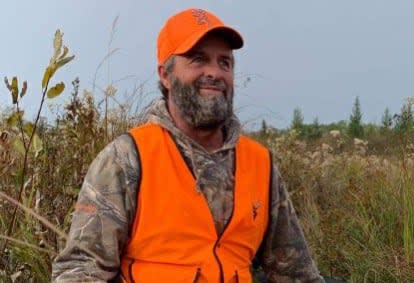Subcontractor wasn't wearing hard hat when he suffered fatal fall, inquest hears

Jurors in a coroner's inquest on Monday heard a New Brunswick carpenter wasn't wearing a hard hat and was following a now-frowned upon method for installing trusses when he fell and hit his head.
Daniel Moore, 59, was installing trusses on a house in Jewetts Mills, about 25 kilometres west of Fredericton, on July 5, 2021, when he fell about nine feet, or about three metres, hitting his head and suffering a traumatic brain injury he died from five days later.
Michel Cyr, manager of investigations for WorkSafeNB, was the first witness to testify in the coroner's inquest into the Hoyt man's death, which is being held at Marysville Place in Fredericton.
Cyr said Moore was working on the top of one of the home's exterior walls, helping install the trusses for the roof.
Part of that work involved walking across the bottom trusses as they were being laid, and bracing them to the previously laid truss using a four-by-one-inch piece of wood.
While installing the last truss, Cyr said, Moore knelt down on one of the wooden pieces of bracing, when it broke.
Cyr said although Moore landed on his feet, he fell back and hit his head on the concrete floor.
Cyr said Moore should have been wearing a hard hat but wasn't
Enforcing safe practices difficult, says contractor
The inquest also heard testimony from Moore's son, who was working at the site, another worker who was at the site, the general contractor who had hired Moore, and an advocate for safe practices in the construction industry.
Tim Tompkins, owner of TNT Insulation and Building Supplies, said he was the general contractor for the project to build a house measuring about 90 feet long and 50 feet wide, with nine-foot-high ceilings.

Daniel Moore died on July 10, 2021, after falling from a bottom truss that was about three metres above ground. (Sunbury Funeral Home)
He said he hired Moore, as he had for about 15 years before, primarily to build the framing and siding of homes.
Tompkins testified he was at the site the day Moore fell, and was aware Moore was only wearing a ball cap as he walked back and forth along the trusses as they were being installed.
Asked whether he ever gave his subcontractors direction when it came to safety, Tompkins said he generally tried to, but his advice wasn't always heeded.
"I certainly wanted them to work safe," Tompkins said.
"I tried to give them advice, but they'd look at me like I'm a retail sales person, not a licensed carpenter, and they take my advice or they don't, unfortunately."
Tompkins said he also tried to get his subcontractors to use scaffolding when installing trusses or rafters on homes they were building, but that advice often wasn't followed either, he said.
"It slows them down," said Tompkins, recalling the excuse he was often met with.
Old versus new way
When it comes to the construction industry, the residential side of it has been the slowest at adopting safety standards, said Roy Silliker, general manager of the New Brunswick Construction Safety Association.
Testifying at the inquest, Silliker said that from what he heard previous witnesses say on Wednesday, the method Moore was following for installing trusses was "the old way" in the construction business.

Roy Silliker, general manager of the New Brunswick Construction Safety Association, says Moore was using an older, unsafe method for installing rafters in the construction of homes. (Aidan Cox/CBC)
"The old way was always just to get up on the truss … with no protection and you took your chances," Silliker said.
"The new way, you have tools available to you like zoom booms, scissor lifts, scaffolding."
Silliker said using those equipment might take workers an extra 30 minutes to get a job done, but he said they were worth using to ensure the job got done safely.
Plus, he said, it should be up to a general contractor to ensure a safe work environment, as is required by legislation.
"I really have concerns with some of the evidence I heard today regarding the knowledge of a general contractor," he said.
"There's general contractors out there that don't think they're general contractors, and they don't realize that as a general contractor you have to make your [subcontractors follow safety rules]. … If they don't do it you put them off the site."
At the outset of the inquest, presiding coroner Sarah Barnett told the five jurors the inquest isn't about assigning blame, but to determine how to prevent similar incidents from happening.
The inquest is expected to hear more witness testimony Thursday morning before jurors are left to decide the manner of death in Moore's case.
The jurors will also have the opportunity to make recommendations on how to possibly prevent a similar incident from happening again.

